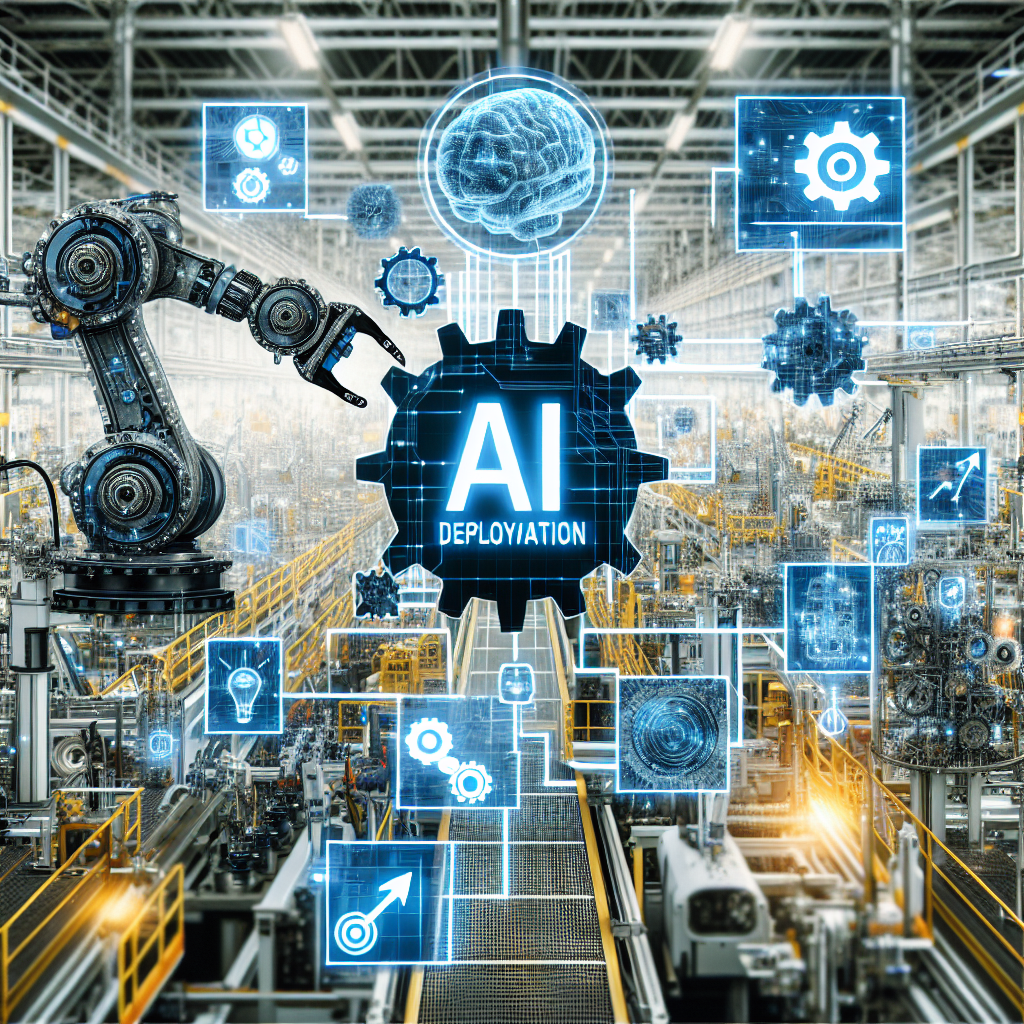Artificial Intelligence (AI) has been revolutionizing the manufacturing industry in recent years, particularly in the area of maintenance scheduling. By leveraging AI technologies, manufacturers are able to optimize their maintenance processes, reduce downtime, and improve overall efficiency. In this article, we will explore how AI is being deployed in manufacturing to enhance maintenance scheduling and address some frequently asked questions about this technology.
AI Deployment in Manufacturing: Improving Maintenance Scheduling
Maintenance scheduling is a critical aspect of manufacturing operations, as it involves planning and carrying out maintenance activities to ensure that equipment and machinery are operating at peak performance. Traditionally, maintenance scheduling has been a time-consuming and labor-intensive process, often relying on manual inspections and fixed maintenance intervals. However, with the advent of AI technologies, manufacturers are now able to take a more data-driven and proactive approach to maintenance scheduling.
One of the key ways in which AI is improving maintenance scheduling in manufacturing is through predictive maintenance. Predictive maintenance involves using AI algorithms to analyze data from sensors, equipment logs, and other sources to predict when maintenance is likely to be needed. By monitoring equipment in real-time and detecting early signs of potential issues, manufacturers can schedule maintenance activities before a breakdown occurs, thereby reducing downtime and avoiding costly repairs.
Another way in which AI is enhancing maintenance scheduling in manufacturing is through the use of machine learning algorithms. Machine learning algorithms can analyze historical maintenance data to identify patterns and trends, allowing manufacturers to optimize their maintenance schedules and resources. By learning from past maintenance incidents, AI systems can recommend the most effective maintenance strategies for each piece of equipment, taking into account factors such as usage patterns, environmental conditions, and equipment age.
Furthermore, AI-powered maintenance scheduling systems can also take into account external factors such as production schedules, resource availability, and budget constraints. By integrating with other systems such as enterprise resource planning (ERP) and manufacturing execution systems (MES), AI algorithms can generate maintenance schedules that are aligned with overall production goals and priorities. This holistic approach to maintenance scheduling helps manufacturers maximize the efficiency of their operations and minimize disruptions to production.
In addition to predictive maintenance and machine learning algorithms, AI is also being used to optimize maintenance schedules in real-time. By continuously monitoring equipment performance and adjusting maintenance schedules on the fly, AI systems can adapt to changing conditions and prioritize maintenance activities based on the most critical needs. This dynamic approach to maintenance scheduling allows manufacturers to respond quickly to unexpected events and minimize the impact on production.
Overall, the deployment of AI in manufacturing is transforming maintenance scheduling from a reactive, time-based process to a proactive, data-driven strategy. By leveraging AI technologies, manufacturers can improve equipment reliability, reduce maintenance costs, and increase overall operational efficiency. As AI continues to evolve and mature, we can expect to see even greater advancements in maintenance scheduling and other areas of manufacturing in the years to come.
FAQs about AI Deployment in Manufacturing: Improving Maintenance Scheduling
Q: How does AI help manufacturers predict when maintenance is needed?
A: AI algorithms analyze data from sensors, equipment logs, and other sources to detect patterns and trends that indicate when maintenance is likely to be required. By monitoring equipment in real-time and identifying early signs of potential issues, AI can predict when maintenance will be needed and schedule it proactively.
Q: Can AI systems recommend the most effective maintenance strategies for each piece of equipment?
A: Yes, machine learning algorithms can analyze historical maintenance data to identify the most effective maintenance strategies for each piece of equipment. By learning from past maintenance incidents, AI systems can recommend the best course of action based on factors such as usage patterns, environmental conditions, and equipment age.
Q: How does AI optimize maintenance schedules in real-time?
A: AI systems continuously monitor equipment performance and adjust maintenance schedules on the fly to respond to changing conditions. By adapting to unexpected events and prioritizing maintenance activities based on critical needs, AI can optimize maintenance schedules in real-time to minimize disruptions to production.
Q: How can manufacturers integrate AI-powered maintenance scheduling systems with other systems such as ERP and MES?
A: AI-powered maintenance scheduling systems can be integrated with other systems such as ERP and MES through APIs and data connectors. By sharing data and insights across different systems, manufacturers can ensure that maintenance schedules are aligned with overall production goals and priorities.
Q: What are the benefits of using AI for maintenance scheduling in manufacturing?
A: The benefits of using AI for maintenance scheduling in manufacturing include improved equipment reliability, reduced maintenance costs, increased operational efficiency, and minimized downtime. By taking a proactive, data-driven approach to maintenance scheduling, manufacturers can optimize their maintenance processes and enhance overall productivity.
In conclusion, AI deployment in manufacturing is transforming maintenance scheduling by enabling manufacturers to take a more proactive, data-driven approach to maintenance. By leveraging predictive maintenance, machine learning algorithms, and real-time optimization capabilities, manufacturers can improve equipment reliability, reduce maintenance costs, and increase operational efficiency. As AI technologies continue to evolve, we can expect to see even greater advancements in maintenance scheduling and other areas of manufacturing, driving continued innovation and growth in the industry.

